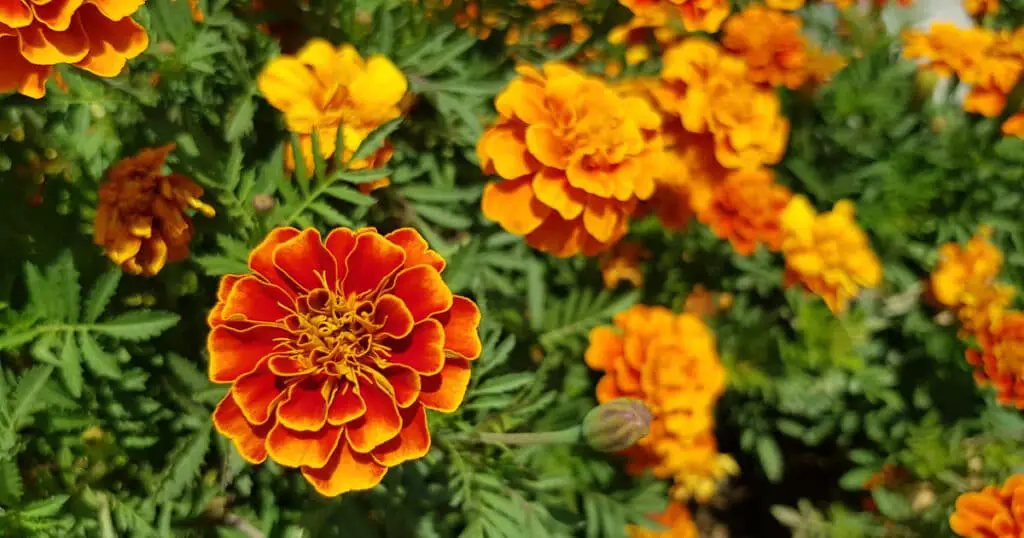The cheerful color and look of marigolds make them popular garden additions. But if you live in an area with a large deer population, you’ve got to consider whether these cervids will raid your flowerbeds. So let’s find out: do deer eat marigolds?
As enthusiastic herbivores, deer aren’t picky about the plants they eat. While there are plants they avoid because of their smell or the fact they’re toxic, deer will eat a wide range of flowers. You’ll be disappointed to hear that this includes marigolds.
So, Do Deer Eat Marigolds? (Answered)
Yes, deer do eat marigolds. But they’re not their favorite flower. They’ll eat marigolds if they cannot find preferred food sources.

Here is an overview of everything we’ll learn in this article:
- Are marigolds deer-resistant?
- Why are deer eating my marigolds?
- How to keep deer out of your marigolds
- What makes some plants deer-resistant and others not?
Are Marigolds Deer Resistant?
Overall, the answer is no. Marigolds aren’t deer-resistant.
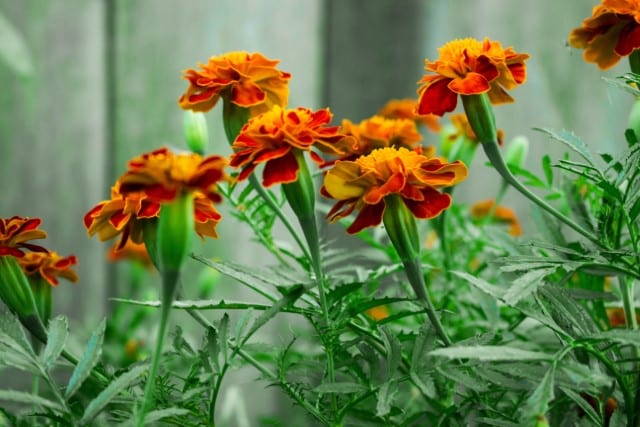
There are some varieties of marigolds with a stronger smell that helps to keep deer away. Cervids dislike strong smells.
But if the scent isn’t strong enough, deer won’t hesitate to dine on your flowers.
As a rule of thumb, choose fragrant varieties of marigolds to reduce the likelihood that deer will eat your flowers.
Why Are Deer Eating My Marigolds?
Marigolds aren’t a deer’s favorite plant, but they’re not deer-resistant, either.
If deer are eating your marigolds, they’re probably having trouble finding other food in their habitats.
How To Keep Deer Out Of Your Marigolds
Here’s our list of things you can take to help stop deer from eating your marigolds:
- Choose the right marigolds
- Avoid plants that attract deer
- Use deer-repellent spray
- Plant hedges
- Install fencing
- Try natural deer-repellents
- Use motion-activated sprinklers
Let’s explore these strategies in detail below.
Choose the Right Marigolds
Marigolds vary in their fragrance. Some are lightly fragranced, while others have a more pungent smell. Marigold flowers comprise 50 different species, with new hybrids and varieties constantly being created.
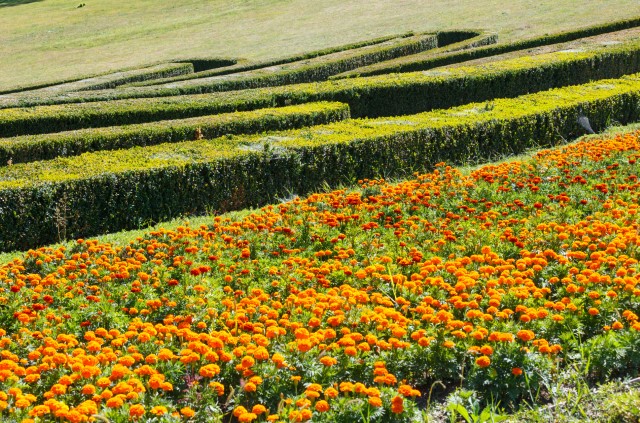
If you live somewhere with a lot of deer, or deer are sleeping in your yard, choose marigolds with a stronger fragrance. As deer dislike strong scents, they’ll be more likely to avoid your flowers.
Visit a local nursery so you can smell different marigold varieties before deciding which one you’d like to purchase.
You can also ask for recommendations from the staff at the nursery to set you in the right direction.
Avoid Plants that Attract Deer
Another way to protect your garden is to remove any plants that deer find particularly palatable, and to plant deer-resistant perennials and annuals deer don’t like to eat instead.
There are many plants that attract deer. Here are some of them below:
- English Ivy
- Daylilies
- Arborvitae
- Fir
- Hostas
- Various fruits and vegetables
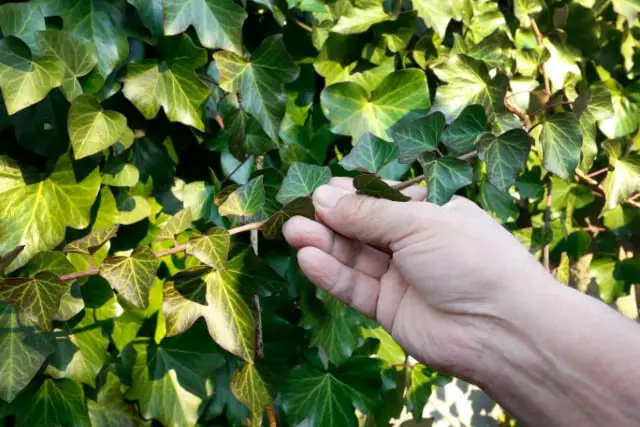
If you’re determined to have any of these plants on your property, position them near your house. Deer are less likely to come near areas where there is frequent human activity.
If you grow vegetables and fruits, ensure you pick them as soon as they start to ripen. This will prevent their appealing smell from drawing deer to your garden.
Use Deer-Repellent Spray
You can also use spray deer repellents, readily available online and at your local hardware store.
Make sure you read the instructions and warnings listed on the bottle. Ensure that it’s safe to apply around all the plants and flowers in your garden.
Plant Hedges
Planting deer-resistant hedges around your garden is an excellent way to deter deer. Boxwoods are typically employed for this purpose.
Their dense surface helps create a compelling visual barrier that prevents deer from entering your garden.
Install Fencing
The installation of a fence is a great idea, but it must be tall enough to keep deer out of your garden. White-tailed deer can leap as high as eight feet. At a minimum, your fence needs to be as tall as this.
Try Natural Deer-Repellants
Planting strong-scented plants or shrubs is a popular method of keeping deer out. Certain plants have proved to be successful in keeping deer away due to their pungent smell and/or unattractive texture.
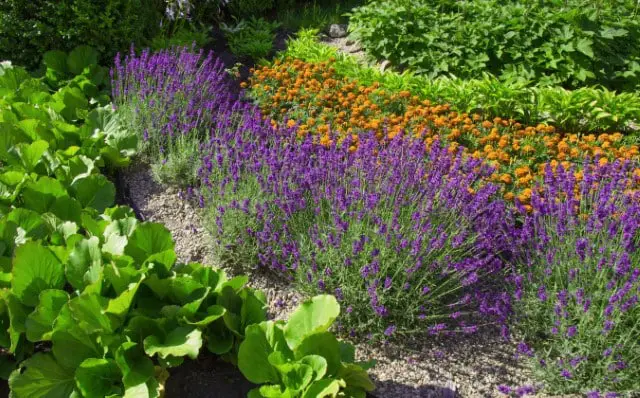
These are:
- Lavender
- Mint
- Thyme
- French tarragon
- Japanese Sirea
- Bush Cinquefoil
- Chives
- Sage
- Rosemary Juniper
Try Motion-Activated Sprinklers
Motion-activated sprinklers can be another excellent solution to repel animals, including deer.
What Makes Some Plants Deer Resistant And Others Not?
Factors such as texture, taste, look, and smell of plants play a crucial role in why certain plants are deer resistant and others not.
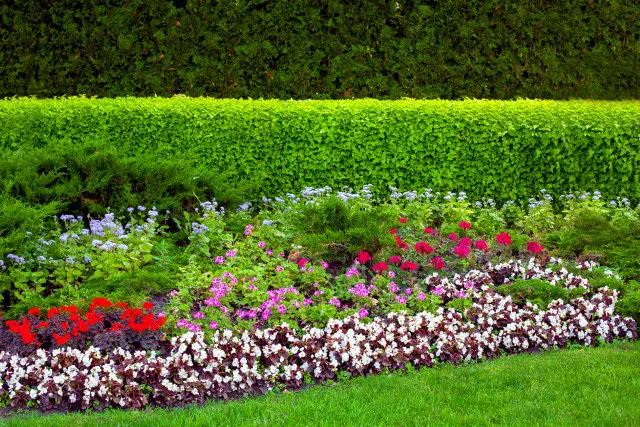
For example, deer like sweet smells and tastes, and fruits such as apples and blueberries are definitely on the menu. They also enjoy narrow-leaf evergreens, particularly arborvitae and fir.
Deer also gravitate towards daylilies, hostas, and English ivy. On the other hand, deer avoid plants, flowers, and food with a strong aroma, fuzzy leaves, thick foliage, bitter taste, thorns, spikes, and sharp edges.
Final Thoughts: Do Deer Eat Marigolds?
Some deer might consider your marigolds to be a delicious snack, but choosing fragrant varieties and planting hem near your home and alongside plants deer avoid can help keep the deer from munching on your flowers.

